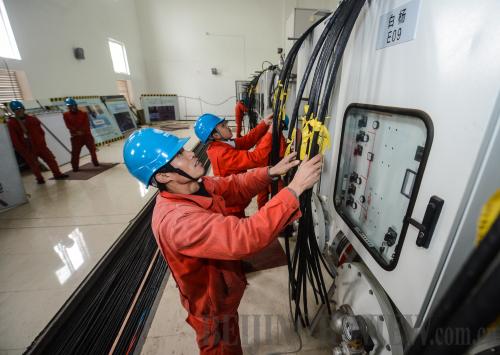|
 |
|
POWER ON: Staff members check power station facilities at a local grid company in Huzhou, Zhejiang Province, on March 12. Since the beginning of 2014, the company has expanded its power generation capacity to meet increasing demand (XU YU) |
Trade Deficit
China reported a large trade deficit in February mainly due to distortion related to the Chinese New Year holidays, marking the first deficit since April 2013.
Last month, the trade deficit stood at $22.98 billion, compared with a surplus of $14.8 billion last February and $31.86 billion this January, the General Administration of Customs (GAC) said in a statement.
Total trade dropped by 4.8 percent year on year to $251.18 billion, with exports dropping 18.1 percent and imports up 10.1 percent, according to the statement.
In January, foreign trade climbed 10.3 percent, with exports rising 10.6 percent and imports up by 10 percent, previous data showed.
"The Spring Festival holiday (January 31 to February 6) factor contributed to large fluctuations in trade volume and the deficit last month," the GAC said.
Chinese companies followed their tradition of rushing to export before the holiday and prioritizing imports after it, the GAC added.
The dramatic fluctuation in the monthly trade figure has caused some concerns about the health of the trade sector.
However, GAC spokesman Zheng Yuesheng played down the fluctuation, saying that trade growth will likely return to normal after the holiday distortion goes away in March.
Moderate Inflation
China's consumer price index (CPI), a main gauge of inflation, increased 2 percent year on year in February, marking easing inflationary pressure since the end of last year, official data showed.
The growth rate was down from 2.5 percent in the previous month and appeared to be at its lowest level since February 2013, according to figures released by the National Bureau of Statistics (NBS) on March 9.
The slowed CPI increase, in line with market expectations, was mainly attributed to the mild growth of food prices, which account for nearly one third of the weighting in the calculation of China's CPI.
Analysts predicted mild inflation would be sustained for several months amid economic downward pressure and weak global commodity prices.
Inflation has slowed in pace for four straight months in China, as the country's economic growth decelerated amid industrial restructuring and furthering reform.
The producer price index (PPI), which measures inflation at the wholesale level, contracted 2 percent year on year in February after a 1.6-percent decline in January, said the NBS.
China's PPI has been in deflationary territory for 24 consecutive months, the longest-lasting drop since the 1990s, according to the bureau.
Private Banks
China will set up five private banks on a trial basis before the practice is extended to more areas, the chief of the country's banking regulator said on March 11.
The first batch of five banks will be in Tianjin, Shanghai, as well as Zhejiang and Guangdong provinces, according to Shang Fulin, Chairman of the China Banking Regulatory Commission (CBRC).
Ten private companies, including Internet firms Alibaba and Tencent, have been selected to take part in the preparation work for setting up the banks, Shang noted, adding that their eligibility as shareholders will be subject to further examination.
Each of the banks will be co-sponsored by at least two private capital providers, Shang said.
Shang did not provide a timetable for the launch of the banks, saying that they will be approved when "conditions are ripe."
Setting up private banks in China was written into an ambitious reform package rolled out after the Third Plenary Session of the 18th Communist Party of China Central Committee in November 2013, representing further opening up of the country's banking sector.
Compared with existing commercial banks, private banks will be subject to the same regulation and supervision, according to the CBRC chief.
But financial services of private banks will be oriented toward small and micro businesses as well as residential communities, Shang explained.
Risk monitoring will be strengthened and shareholders' behaviors will be regulated, Shang added.
| 